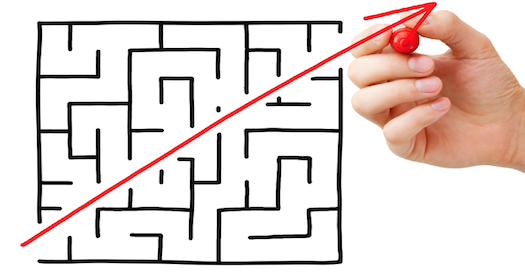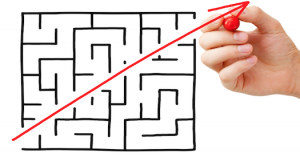The Diderot Effect: Why We Want Things We Don’t Need
— And What to Do About It

The famous French philosopher Denis Diderot lived nearly his entire life in poverty, but that all changed in 1765.
Diderot was 52 years old and his daughter was about to be married, but he could not afford to provide a dowry. Despite his lack of wealth, Diderot’s name was well-known because he was the co-founder and writer of Encyclopédie, one of the most comprehensive encyclopedias of the time.
When Catherine the Great, the emperor of Russia, heard of Diderot’s financial troubles she offered to buy his library from him for £1000 GBP, which is approximately $50,000 USD in 2015 dollars. Suddenly, Diderot had money to spare.
Shortly after this lucky sale, Diderot acquired a new scarlet robe. That’s when everything went wrong.
Is there anything Diderot Effect has in common with home biz online?
Of course it has. When you join any kind of business you’ll find that you need not only website link to promote, but also landing pages, autoresponder, tracking software, front end and back end offer etc.
Read at the end of this post perfect solution to this – that is done for you..
The Diderot Effect
Diderot’s scarlet robe was beautiful. So beautiful, in fact, that he immediately noticed how out of place it seemed when surrounded by the rest of his common possessions. In his words, there was “no more coordination, no more unity, no more beauty” between his robe and the rest of his items. The philosopher soon felt the urge to buy some new things to match the beauty of his robe.
He replaced his old rug with a new one from Damascus. He decorated his home with beautiful sculptures and a better kitchen table. He bought a new mirror to place above the mantle and his “straw chair was relegated to the antechamber by a leather chair.”
These reactive purchases have become known as the Diderot Effect.
The Diderot Effect states that obtaining a new possession often creates a spiral of consumption which leads you to acquire more new things. As a result, we end up buying things that our previous selves never needed to feel happy or fulfilled.
Why We Want Things We Don’t Need
Like many others, I have fallen victim to the Diderot Effect (says James Clear, writer, personal growth). I recently bought a new car and I ended up purchasing all sorts of additional things to go inside it. I bought a tire pressure gauge, a car charger for my cell phone, an extra umbrella, a first aid kit, a pocket knife, a flashlight, emergency blankets, and even a seat belt cutting tool.
Allow me to point out that I owned my previous car for nearly 10 years and at no point did I feel that any of the previously mentioned items were worth purchasing. And yet, after getting my shiny new car, I found myself falling into the same consumption spiral as Diderot.
You can spot similar behaviors in many other areas of life:
- You buy a new dress and now you have to get shoes and earrings to match.
- You buy a CrossFit membership and soon you’re paying for foam rollers, knee sleeves, wrist wraps, and paleo meal plans.
- You buy your kid an American Girl doll and find yourself purchasing more accessories than you ever knew existed for dolls.
- You buy a new couch and suddenly you’re questioning the layout of your entire living room. Those chairs? That coffee table? That rug? They all gotta go.
Life has a natural tendency to become filled with more. We are rarely lookingto downgrade, to simplify, to eliminate, to reduce. Our natural inclination is always to accumulate, to add, to upgrade, and to build upon.
In the words of sociology professor Juliet Schor, “the pressure to upgrade our stock of stuff is relentlessly unidirectional, always ascending.”
Mastering the Diderot Effect
The Diderot Effect tells us that your life is only going to have more things fighting to get in it, so you need to to understand how to curate, eliminate, and focus on the things that matter.
Reduce exposure. Nearly every habit is initiated by a trigger or cue. One of the quickest ways to reduce the power of the Diderot Effect is to avoid the habit triggers that cause it in the first place. Unsubscribe from commercial emails. Call the magazines that send you catalogs and opt out of their mailings. Meet friends at the park rather than the mall. Block your favorite shopping websites using tools like Freedom.
Buy items that fit your current system. You don’t have to start from scratch each time you buy something new. When you purchase new clothes, look for items that work well with your current wardrobe. When you upgrade to new electronics, get things that play nicely with your current pieces so you can avoid buying new chargers, adapters, or cables.
Set self-imposed limits. Live a carefully constrained life by creating limitations for you to operate within.
Buy One, Give One. Each time you make a new purchase, give something away. Get a new TV? Give your old one away rather than moving it to another room. The idea is to prevent your number of items from growing. Always be curating your life to include only the things that bring you joy and happiness.
Go one month without buying something new. Don’t allow yourself to buy any new items for one month. Instead of buying a new lawn mower, rent one from a neighbor. Get your new shirt from the thrift store rather than the department store. The more we restrict ourselves, the more resourceful we become.
Let go of wanting things. There will never be a level where you will be done wanting things. There is always something to upgrade to. Get a new Honda? You can upgrade to a Mercedes. Get a new Mercedes? You can upgrade to a Bentley. Get a new Bentley? You can upgrade to a Ferrari. Get a new Ferrari? Have you thought about buying a private plane? Realize that wanting is just an option your mind provides, not an order you have to follow.




